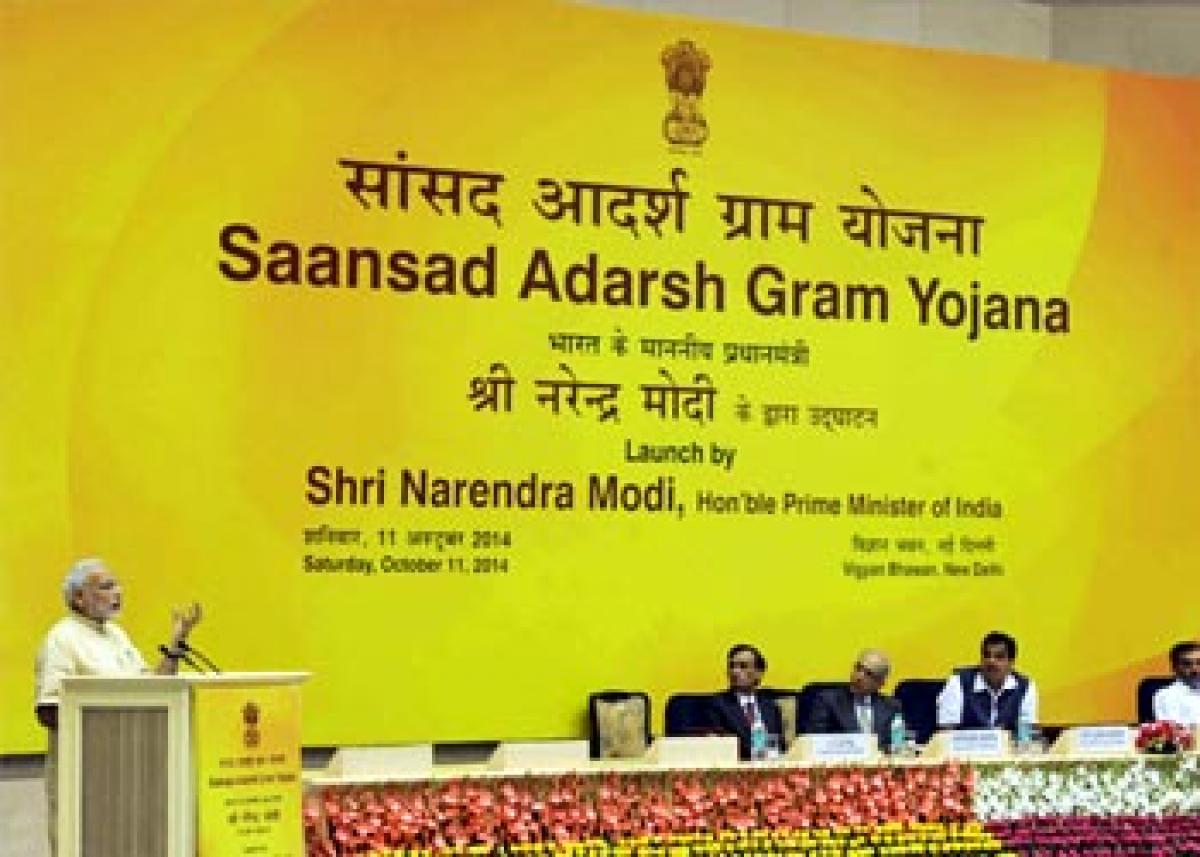Live
- Sensex, Nifty drift lower on profit booking
- Jagan treated cadres as ‘subordinates’, alleges Grandhi
- Mpower’s survey on edu loans
- IIP growth falls to 3.5% in Oct
- Easing food prices lower retail inflation to 5.48% in November
- Space allocation for packaging units at MSME parks on anvil
- Maha Kumbh: Yogi reviews preparations
- Gadkari on accidents: I try to hide my face in meetings abroad
- Abetment of suicide: Mere harassment not sufficient to find accused guilty says SC
- 6.79L homes to receive water under Amrut-II
Just In

The funds crunch at the Centre seems to have adversely impacted the schemes meant for the rural poor which are managed by the union rural development ministry.
New Delhi: The funds crunch at the Centre seems to have adversely impacted the schemes meant for the rural poor which are managed by the union rural development ministry.
Low interest in Sansad Adarsh Gram Yojana (SAGY) and delayed payments to workers under the Mahatma Gandhi National Rural Employment Guarantee Scheme (MNREGS) give credence to the claim.
Records with rural development ministry suggest that only 29 of the 543 Lok Sabha members have nominated gram panchayats from their respective constituencies in the second phase of the scheme. The case is even worse with the Rajya Sabha members as only five of the 252 members have identified the target villages. The deadline for the initial phase of nominations ended last month.
The funds crunch also impacts other schemes. Rural Development Minister Birender Singh has made an appeal to commercial banks and private micro-investors to disburse money to people for building toilets at home, so that any shortfall in funds can be met from other sources.
"There are people who are not below the poverty line, but still do not have toilets at their home. We have appealed to the companies and the NGOs to help fund toilets to make our villages free from open defecation," Birender Singh told IANS.
The minister said that each below-poverty-line family was being given Rs.12,000 for building a toilet. But the need apparently is greater.
According to an official in the ministry, who did not wish to be named, the minister had also made an appeal to banks and private investors to fund some of the rural development schemes where the ministry was falling short of money. Corporate houses, too, are being approached, the source said.
Lack of funds was the primary reason behind the low interest in the village adoption scheme, the source said.
"I know the response is not up to the mark and I will be writing to the MPs for that. The major complaint of the MPs is that there should be additional funds which should be provided for the villages they have selected," the minister said, adding that he did not see any scope for allocating additional money in this budget.
"But I will write to the finance ministry for some sort of matching grant which can be provided from our side," he said.
He felt that additional funds may invoke interest of more members of parliament in the scheme. But a ministry source said that it would be difficult to raise more resources for the schemes.
"Our ministry cannot allocate additional funds for the villages. State governments are not lending a helping hands either," the source said.
For SAGY, where parliamentarians adopt gram panchayats, the prime minister and only eight ministers have made nominations. They include Ashok Gajapati (Andhra Pradesh), Ramvilas Paswan (Bihar), Jitendra Singh (Jammu & Kashmir), Sushma Swaraj (Madhya Pradesh), Bandaru Dattatreya (Telangana) and Babul Supriyo (West Bengal)
Three ministers hailing from the Rajya Sabha -- Nirmala Sitharaman, Mukhtar Abbas Naqvi and Thaawar Chand Gehlot -- have also identified the villages to be developed under the second phase of SAGY.
As for MGNREGS, reports available with the ministry suggest that over 70 percent wages have not been paid on time to workers so far in 2015-16.
According to details available, 44.6 percent of the payments to workers were delayed between 15 to 30 days, 20.8 percent were delayed between 30 to 60 days, 4.3 percent were delayed for 60 to 90 days while 2.3 percent were delayed for more than 90 days.
"We have allocated more than 95 percent of the money but it is the state governments who are dragging their feet causing delay in payments," the ministry source said.
Though the Narendra Modi government had announced an increase in funding for MGNREGS, the hike does not find reflection on the ground.

© 2024 Hyderabad Media House Limited/The Hans India. All rights reserved. Powered by hocalwire.com







